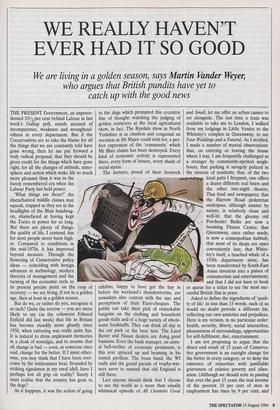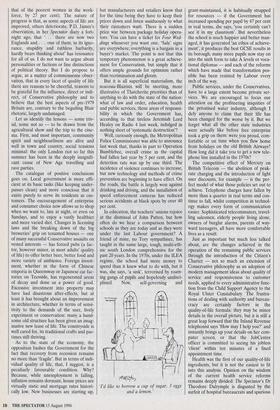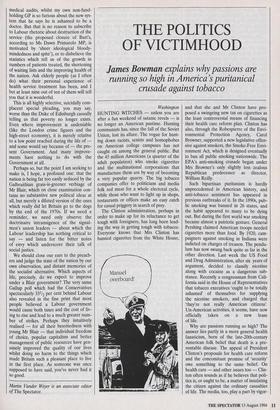WE REALLY HAVEN'T EVER HAD IT SO GOOD
We are living in a golden season, says Martin Vander Weyer,
who argues that British pundits have yet to catch up with the good news
THE PRESENT Government, an unprece- dented 331/2 per cent behind Labour in last week's Gallup poll, stands accused of incompetence, weakness and wronghead- edness in every department. But if the Conservatives are to take the blame for all the things that we are constantly told have gone wrong, then let me put forward a truly radical proposal: that they should be given credit for the things which have gone right, for all the changes of attitude, atmo- sphere and action which make life so much more pleasant than it was in the barely remembered era when the Labour Party last held power.
`What things are those?' the disenchanted middle classes may squeak, trapped as they are in the headlights of the Blair bandwag- on, shamefaced at having kept the Tories in power for so long. But there are plenty of things: the quality of life, I contend, has for most people never been high- er. Compared to conditions in the mid-1970s, it has improved beyond measure. Through the flowering of Conseryative policy ideas — coinciding with benign advances in technology, modem theories of management and the turning of the economic cycle to its present precise point on the cusp of recovery — we are living, if not in a golden age, then at least in a golden season.
But do we, or rather do you, recognise it as such? Quite the reverse — you are more likely to say (as the columnist Edward Enfield did last week) that life in Britain has become steadily more ghastly since 1950, when rationing was really quite fun. It is natural to dress unpleasant memories in a cloak of nostalgia, and to assume that all change is bad — even, as someone once said, change for the better. If I insist other- wise, you may think that I have been over- come by the midsummer heat. Stranded by striking signalmen in my rural idyll, have I perhaps lost all grip on reality? Surely I must realise that the country has gone to the dogs?
As it happens, it was the action of going to the dogs which prompted this eccentric line of thought: watching the judging of golden retrievers at the local agricultural show, in fact. The Ryedale show in North Yorkshire is as classless and congenial an occasion as Mr Major could wish for, a per- fect expression of the 'community' which Mr Blair claims has been destroyed. Every kind of economic activity is represented there, every form of leisure, every shade of social status.
The farmers, proud of their livestock exhibits, happy to have got the hay in before the weekend's thunderstorms, are nowadays also content with the size and promptness of their Euro-cheques. The public can take their pick of remarkable bargains on the clothing and household goods stalls and of a huge variety of whole- some foodstuffs. They can drink all day in the car park or the beer tent. The Land Rover and Nissan dealers are doing good business. Even the bank manager, an annu- al bell-wether of economic pessimism, is this year spruced up and beaming in his tented pavilion. The brass band, the WI stalls and the grand parade of trophy-win- ners serve to remind that old England is still there.
Lest anyone should think that I choose to see the world as a more than usually whimsical episode of All Creatures Great Asked to define the ingredients of 'quali- ty of life' in less than 15 words, each of us would no doubt provide a different list, reflecting our own anxieties and prejudices. Here is my version, in no particular order: health, security, liberty, social interaction, pleasantness of surroundings, opportunities for self-fulfilment, diet, entertainment.
I am not proposing to argue that the direct end result of 15 years of Conserva- tive govemment is an outright change for the better in every category, or to deny the existence of minorities with justifiable grievances of relative poverty and alien- ation. (Although we should note in passing that over-the past 15 years the real income of the poorest 10 per cent of men in employment has risen by 9 per cent, and that of the poorest women in the work- force, by 27 per cent). The nature of progress is that, as some aspects of life are improved, others deteriorate, P.D. James's observation, in her Spectator diary a fort- night ago, that `. . there are now two Englands and . . . one of them, in its igno- rance, stupidity and ruthless barbarity, hardly bears thinking about' has resonance for all of us. I do not want to argue about personalities or factions or fine distinctions of political theory. But I do propose to argue, as a matter of commonsense obser- vation, that in every facet of quality of life there are reasons to be cheerful, reasons to be grateful for the influence, direct or indi- rect, of Conservative philosophy and to believe that the best aspects of pre-1979 Britain are, contrary to the beguiling Blair rhetoric, largely undamaged.
Let us identify the lessons — some triv- ial, some not so — to be drawn from the agricultural show and the trip to the cine- ma. First, and most important, community spirit and neighbourliness are alive and well in town and country, social tensions minimal: the only London riot so far this summer has been in the deeply insignifi- cant cause of New Age travelling and rave parties.
The catalogue of positive conclusions goes on. Local government is more effi- cient at its basic tasks (like keeping under- passes clean) and more conscious that it exists purely to serve its residents as cus- tomers. The encouragement of enterprise and consumer choice now allows us to shop when we want to, late at night, or even on Sundays, and to enjoy a vastly healthier and more varied diet. Changes in licensing laws and the breaking down of the big breweries' grip on tenanted houses — one of many successful Conservative assaults on vested interests — has forced pubs (a fac- tor, however minor, in most adults' quality of life) to offer better beer, better food and more variety of ambience. Foreign invest- ment, whether in the form of Chinese emporia in Queensway or Japanese car fac- tories on Teesside, has regenerated areas of decay and done us a power of good. Excessive investment into property may have had disastrous after-effects, but at least it has brought about an improvement in architecture, whether in terms of sensi- tivity to the demands of the user, lively experiment or conservation: many a hand- some old structure has been given an imag- inative new lease of life. The countryside is well cared for, its traditional crafts and pas- times still thriving.
As to the state of the economy, the opposition bashes the Government for the fact that recovery from recession remains no more than 'fragile'. But in terms of indi- vidual quality of life, that, I suggest, is a peculiarly favourable condition, Why? Because, while unemployment is falling, inflation remains dormant, house prices are virtually static and mortgage rates histori- cally low. New businesses are starting up, but manufacturers and retailers know that for the time being they have to keep their prices down and listen assiduously to what their Customers want. There is a sudden price war between package holiday opera- tors. You can have a ticket for Four Wed- dings whenever you want one. 'Sale' signs are everywhere; everything is a bargain in a buyer's market. The point is not that this temporary phenomenon is a great achieve- ment for Conservatism, but simply that it offers ample grounds for optimism rather than recrimination and gloom.
But it is all superficial materialism, the nouveau-Blairists will be snorting, more illustrative of Thatcherite priorities than of anything to do with the state of the nation: what of law and order, education, health and public services, those areas of responsi- bility in which the Government has, according to that tireless Jeremiah Lord Healey on Radio 4 last week, indulged in nothing short of 'systematic destruction'?
Well, curiously enough, the Metropolitan Police Commissioner was able to announce last week that, thanks in part to Operation Bumblebee, overall crime in the capital had fallen last year by 5 per cent, and the detection rate was up by one third. The incidence of violence continues to increase, but new technology and methods of crime prevention are beginning to have effect. On the roads, the battle is largely won against drinking and driving, and the installation of speed enforcement cameras has reduced serious accidents at black spots by over 40 per cent.
In education, the teachers' unions rejoice at the dismissal of John Patten, but how often do we hear a comparison between schools as they are today and as they were under the last Labour government? A friend of mine, no Tory sympathiser, has taught in the same large, tough, multi-eth- nic south London comprehensive for the past 20 years. In the 1970s, under the ILEA regime, the school had more money to spend than it knew what to do with, but it was, she says, 'a sink', terrorised by roam- ing gangs of pupils and hopelessly undisci- plined. Now, self-governing and 'I'd like to borrow a cup of sugar, 3 eggs and a lemon.' grant-maintained, it is habitually strapped for resources — if the Government has increased spending per pupil by 47 per cent in real terms, she says, 'you certainly can't see it in my classroom'. But nevertheless the school is much happier and better man- aged, it has generated 'an ethos of achieve- ment', it produces the best GCSE results in its borough, many more pupils now stay on into the sixth form to take A levels or voca- tional diplomas — and each of the reforms which have made that transformation pos- sible has been resisted by Labour every inch of the way.
Public services, under the Conservatives, have to a large extent become private ser- vices. We are encouraged to focus our attention on the profiteering iniquities of the privatised water industry, although I defy anyone to claim that their life has been changed for the worse by it. But we forget what all the other state industries were actually like before free enterprise took a grip on them: were you proud, com- fortable or on time when you flew home from holidays on the old British Airways? How long did it take you to get a new tele- phone line installed in the 1970s?
The competitive effect of Mercury on British Telecom — the abolition of peak- rate charging and the introduction of light user discounts, for example — is the per- fect model of what those policies set out to achieve. Telephone charges have fallen by more than a quarter in real terms and con- tinue to fall, whilst competition in technol- ogy makes every form of communication easier. Sophisticated telecommuters, travel- ling salesmen, elderly people living alone, owners of burglar alarms, parents of way- ward teenagers, all have more comfortable lives as a result.
Just as important but much less talked about, are the changes achieved in the operation of the remaining public services through the introduction of the Citizen's Charter — not so much an extension of Conservative philosophy as an adoption of modern management ideas about quality of service and responsiveness to customer needs, applied to every administrative func- tion from the Child Support Agency to the Royal Ulster Constabulary. The frustra- tions of dealing with authority and bureau- cracy are certainly factors in the quality-of-life formula: they may be minor details in the overall picture, but it is still a great leap forward that the Inland Revenue telephonist says 'How may I help you?' and instantly brings up your details on her com- puter screen, or that the JobCentre officer is committed to seeing his jobless `client' within ten minutes of a fixed appointment time.
Health was the first of our quality-of-life ingredients, but it is not the easiest to fit into this analysis. Opinion on the wisdom of the current health service reforms remains deeply divided: The Spectator's Dr Theodore Dalrymple is disgusted by the surfeit of hospital bureaucrats and spurious medical audits, whilst my own non-fund- holding GP is so furious about the new sys- tem that he says he is ashamed to be a doctor. But that is no reason to subscribe to Labour rhetoric about destruction of the service (the proposed closure of Bart's, according to Ms Dawn Primarolo MP, is motivated by 'sheer ideological bloody- mindedness and spite'), or to disbelieve the statistics which tell us of the growth in numbers of patients treated, the shortening of waiting lists and the improving health of the nation. Ask elderly people (as I often do) what their personal experience of health service treatment has been, and I bet at least nine out of ten of them will tell you that it is wonderful.
This is all highly selective, suicidally com- placent special pleading, you may say, worse than the Duke of Edinburgh casually telling us that poverty no longer exists. Even where improvement is undeniable (like the London crime figures and the high-street economy), it is merely relative to a low point reached during the life of and some would say because of — the pre- sent Government. And many improve- ments have nothing to do with the Government at all.
Perhaps so, but the point I am seeking to make is, I hope, a profound one: that the nation is being far too easily seduced by the Galbraithian grass-is-greener verbiage of Mr Blair, which on close examination con- tains no substantive new political ideas at all, but merely a diluted version of the ones which really did let Britain go to the dogs by the end of the 1970s. If we need a reminder, we need only observe the doctrinaire intransigence of the signal- men's union leaders — about which the Labour leadership has nothing critical to say — and listen for the bitter notes of envy which underscore their talk of social justice.
We should close our ears to the preach- ers and judge the state of the nation by our own observation, and distant memories of the socialist alternative. Which aspects of life, precisely, do we expect to improve under a Blair government? The very same Gallup poll which had the Conservatives spectacularly 331/2 per cent behind Labour also revealed in the fine print that most people believed a Labour government would cause both taxes and the cost of liv- ing to rise and lead to a much greater num- ber of strikes. Perhaps they intuitively realised — for all their besottedness with young Mr Blair — that individual freedom of choice, popular capitalism and better management of public resources have gen- uinely improved the quality of our lives whilst doing no harm to the things which made Britain such a pleasant place to live in the first place. As someone was once supposed to have said, you've never had it so good.
Martin Vander Weyer is an associate editor of The Spectator.












































 Previous page
Previous page